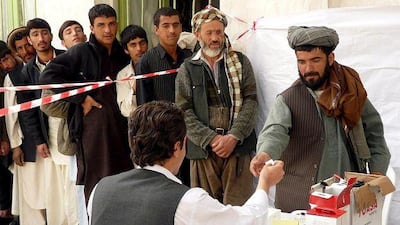NEW YORK // As White House policymakers devise tactics for tackling Afghanistan, UN officials, analysts and academics are presenting divergent strategies on how to best restore stability to the country.
Against the backdrop of widespread violence, the recent decision by the US president, Barack Obama, to deploy an additional 17,000 troops has raised hopes about what can be achieved in Afghanistan this year. On Friday, Gordon Duguid, a state department spokesman, said planners were devising a strategy that may be similar to the 2007 surge in Iraq, but that the policy has "not yet been cemented". With so much at stake in the new administration's approach, the UN, think tanks and newspaper opinion pages have become forums for the debate. Some argue for the full-scale reconstruction of Afghanistan with a democratic government; others suggest the less ambitious approach of simply leaving the nation unable to export extremist ideology or combatants.
The latest UN report on Afghanistan depicts a civilian population struggling in the face of insurgency, corruption and wholesale drug production, with last year ranking as the country's most violent since 2001. "Security has continued to deteriorate ? aid efforts have fallen short of popular expectations ? the rule of law has remained insufficiently institutionalised," says the 18-page report, which records an average of 857 incidents each month in the second half of 2008.
Speaking after his first meeting with Mr Obama last week, the UN secretary general, Ban Ki-moon, described the addition of US soldiers as "helpful and effective", but warned that deployment should be accompanied by a "political surge". "Afghanistan is still going through a very fragile and volatile situation in terms of security and their domestic politics," Mr Ban said. "Therefore we need to address all these issues from a comprehensive perspective."
The war against Taliban rule in Afghanistan seemed won when a US-led invasion ousted the Islamist regime in 2001. But the militant movement has regained control over swathes of the country despite the efforts of US and Nato forces. The planned US deployment will target the south of Afghanistan where the insurgency is at its worst, but those soldiers are unlikely to be fully in place until July, under current planning.
Now, Mr Ban says, Afghanistan is "at another crossroads", with 2009 a critical juncture and presidential elections, to be held on Aug 20, likely to occur against a backdrop of heightened violence. After his White House meeting last week, the world's top diplomat lauded Mr Obama's "new and fresh look" while also highlighting this month's meeting on Afghanistan being hosted by the Netherlands. The UN chief's special representative for Afghanistan, Kai Eide, has already visited Tehran this month to explore avenues for co-operation between Iran and its neighbour.
A one-day ministerial meeting in The Hague on March 31 will see Afghanistan's neighbours, including Iran, join the United States and others to brainstorm strategies to improve security and reconstruct the war-shattered country. Mr Ban described the conference as an "opportunity to define a common way forward" in Afghanistan - a position echoed by many analysts as White House chiefs conduct their policy review.
A 20-page report from the International Crisis Group published on Friday criticised the "short-term" policies adopted by the previous US administration that failed to produce "robust representative Afghan institutions". "The Taliban today are not a standing army but rather a disparate network of groups," said the group's senior analyst, Joanna Nathan. They do "not have significant public support among a population tired of war and the vast majority of people remain far more fearful of what would happen if foreign troops were to leave rather than stay".
The document calls on the White House to adopt "new political, economic and military policies that empower Afghan civilian institutions" to marginalise Taliban fighters and ideology. "The Afghanistan crisis is the outcome of decades of internal conflict," said Gareth Evans, the president of the policy think tank. "No short-term solution will resolve the crisis overnight. Time and patience are needed to build the infrastructure and institutions to stabilise the Afghan state and root out or neutralise jihadi influence."
But Stephen Biddle, a defence analyst for the Council on Foreign Relations, warned that US policymakers are cautious about whether Afghan goals of social development can be achieved. The author of Explaining Victory and Defeat in Modern Battle said the aspirations of Mr Obama's foreign policy team had already "headed downwards" as it conducts its review. "The administration clearly already believes that the sort of centralised modern administrative democratic government based in Kabul ? is overambitious for the near or midterm," Mr Biddle said.
The reinforcements and subsequent counterinsurgency operations will see death tolls rise again this year before the planned surge can achieve the desired goal of improved security, he said. "I am guardedly optimistic, but things will surely get worse before they get better," Mr Biddle said. "And it will be a while before they get better." Other analysts have even lower expectations, with Leslie Gelb, the council's president emeritus, arguing for a strategy of "containing and deterring" extremists rather than "the current approach of counterinsurgency and nation-building".
"President Obama and Congress owe it to both Afghans and Americans to explore a strategy of power extrication before they make another major decision to expand the war," Mr Gelb wrote in an opinion piece published in The New York Times on Friday. jreinl@thenational.ae

